高中英语时态语态讲解
高中英语动词时态语态考点详解版

表格式一般现在时态和语态2. Jenny (has) a good friend?3. Brian (not live) in China.4. Li Ming with me (be) in Beijing.5. If it (not rain)tomorrow, we will go to the park.6. Our teacher said that the earth (go)around the sun yesterday.7.He (help)the old man every week .8.The old man (help)by him every week.9.The building (visit) by many people every year.一一般现在时(一)定义:主要用来表示人、事物的现在状况和特点;表示经常或习惯性的动作,句子中常有often, always, from time to time 等时间状语;表示客观规律和永恒真理等He usually goes to work at 7 o’clock every morning. The earth goes around the sun. Guangzhou is situated in the south of China.(二)标志词:always, usually, often, sometimes, hardly ever,every week (day, year, month…),once /twice a week, on Sundays,(三)谓语动词构成:1 be动词的一般现在时:am is are("是",“在”)2 当谓语动词是行为动词的时候:(1)当主语不是第三人称单数的时候,一般现在时用行为动词的原形(2)主语是he,she,it等第三人称单数(除去I,you以外的任何一个单数的名词或者代词),动词要变形加s或es.(温馨提示:动词变形要符合两个条件:1,主语是三单,2,句子是肯定句)(四).基本结构:1,肯定句:主语+谓语(+其他的)He loves sports. Jane is an outgoing girl.(主语He是三单,又是肯定句,所以谓语动词发生变形,加上了s)Tom and Tim both have medium height.He has a big mouth. We like the dog very much.2,否定句:主语+don’t或者doesn’t+动词原形+其他(在be或者后面加上do does) Candy doesn’t do her housework every day. We don’t dance .He isn’t a worker.3,一般疑问句:Do (Does)+主语+动词原形+其他?(把be或者do does 提到主语的前面)Does she like English? Yes,she does. No,she doesn’t.Do you swim in summer? Are you a teacher?4,特殊疑问句:疑问词+一般疑问句Where does Tom come from?(五) 一般现在时态用法(1)经常性或习惯性的动作,常与这样的时间状语连用:eg: We always help each other. It often snows in winter. I get up early every morning.(2)表示主语现在的特征、性格、能力等。
高中英语动词的时态和语态

高中英语动词的时态和语态1、表示在过去某一时间点发生的动作或所处的状态,与现在没有关系。
常用的时间状语有:yesterday, last night, at that time等。
2、表示在过去某一段时间里反复出现的动作或状态,与现在没有关系。
3、用used to do或would do表示过去经常或反复发生的动作。
4、有些情况发生的时间没清楚表明,但实际上是“刚才,刚刚”发生的,属于过去时间,应使用过去时态。
常见的有I didn’t know…或I forgot…等。
5、一般过去时可与today, this week, this month等时间状语连用。
三、一般将来时1、will/shall do(1)表示将来会出现的动作或状态。
常用的时间状语:this evening, tomorrow, next week/month…,at the end of this term, in a few minutes等。
(2)表示将来经常发生的动作。
(3)表示事物的固有属性或必然趋势、倾向。
(4)表示说话过程中做出某种决定。
注意:条件状语从句中的will表示“决心,意愿”,此时will是情态动词表示意愿。
2、be going to do(1)表示已经决定或安排要做的事。
(2)表示根据某种迹象认为在最近或将来将要发生的事。
3、be to do(1)表示约定、计划或按职责、义务要求即将发生的动作。
(2)表示说话人的意志、意图、职责、义务、命令。
(3)表示注定要发生的事情。
4、be about to do(1)表示即将发生的动作,意为“正要,即将”。
(2)不可与表示具体的将来时间的副词或副词性短语连用,但可以同由as或when 引导的时间状语从句连用。
5、某些动词的现在进行时表示即将发生的动作。
四、过去将来时1、would/should do表示从过去某一时间来看将要发生的动作或将要存在的状态。
通常用于其主句的谓语为过去时态的宾语从句中。
高中英语语法必备之谓语动词的时态和语态详解
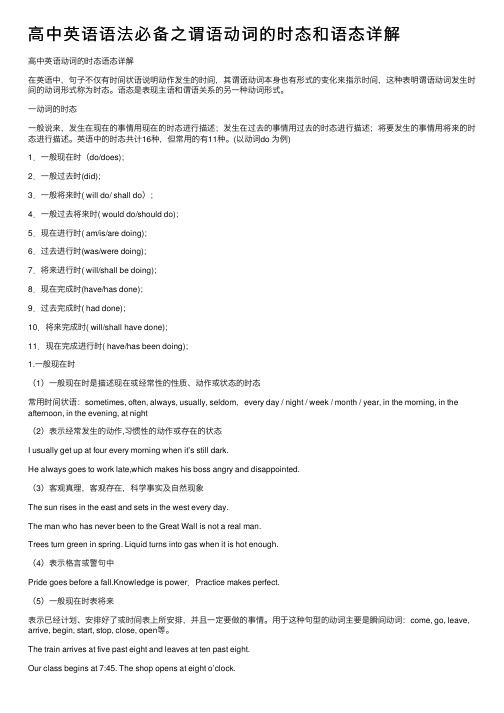
⾼中英语语法必备之谓语动词的时态和语态详解⾼中英语动词的时态语态详解在英语中,句⼦不仅有时间状语说明动作发⽣的时间,其谓语动词本⾝也有形式的变化来指⽰时间,这种表明谓语动词发⽣时间的动词形式称为时态。
语态是表现主语和谓语关系的另⼀种动词形式。
⼀动词的时态⼀般说来,发⽣在现在的事情⽤现在的时态进⾏描述;发⽣在过去的事情⽤过去的时态进⾏描述;将要发⽣的事情⽤将来的时态进⾏描述。
英语中的时态共计16种,但常⽤的有11种。
(以动词do 为例)1.⼀般现在时(do/does);2.⼀般过去时(did);3.⼀般将来时( will do/ shall do);4.⼀般过去将来时( would do/should do);5.现在进⾏时( am/is/are doing);6.过去进⾏时(was/were doing);7.将来进⾏时( will/shall be doing);8.现在完成时(have/has done);9.过去完成时( had done);10.将来完成时( will/shall have done);11.现在完成进⾏时( have/has been doing);1.⼀般现在时(1)⼀般现在时是描述现在或经常性的性质、动作或状态的时态常⽤时间状语:sometimes, often, always, usually, seldom,every day / night / week / month / year, in the morning, in the afternoon, in the evening, at night(2)表⽰经常发⽣的动作,习惯性的动作或存在的状态I usually get up at four every morning when it’s still dark.He always goes to work late,which makes his boss angry and disappointed.(3)客观真理,客观存在,科学事实及⾃然现象The sun rises in the east and sets in the west every day.The man who has never been to the Great Wall is not a real man.Trees turn green in spring. Liquid turns into gas when it is hot enough.(4)表⽰格⾔或警句中Pride goes before a fall.Knowledge is power.Practice makes perfect.(5)⼀般现在时表将来表⽰已经计划、安排好了或时间表上所安排,并且⼀定要做的事情。
(完整版)高中语法之常用时态语态详解

第四章时态和语态一.动词的时态英语时态用共有十六种时态,其中常用的有8种,它们是:一般现在时、一般过去时、一般将来时、现在进行时、现在完成时、过去进行时、过去完成时和过去将来时。
一. 一般现在时.1.构成. be动词:am is are ; 其他动词用动词原形,当主语是第三人称单数时要在谓语动词后加“s”,其变化规则与名词变复数一致。
2.用法. 1). 经常性或习惯性的动作,常与表示频度的时间状语连用。
如usually, always, often, seldom, never, every...,eg. I leave home for school at 7 every morning.I don’t leave home for school at 7 every morning.Do I leave home for school at 7 every morning?He usually gets up early.He doesn’t usually get up early.Does he usually get up early?2) 客观真理,客观存在,科学事实。
eg. The earth moves around the sun.The earth doesn’t move around the sun 否定句Does the earth move around the sun? 疑问句Shanghai lies in the east of China.Shanghai doesn’t lie in the east of China 否定句Does Shanghai lie in the east of China? 疑问句Water boils at 100 centigrade degrees.3) 表示格言或警句中eg. Pride goes before a fall.注意. 此用法如果出现在宾语从句中,即使主句是过去时,从句谓语也要用一般现在时。
高中英语动词时态、语态知识难点讲解

1、一般现在时(1)表示经常发生的动作或现在存在的状态,常与sometimes, always,often, every day等时间状语连用。
如: Sometimes, we go swimming after school.(2)表示客观真理、科学事实等。
如:The earth goes round the sun.2、现在进行时(1) 表示说话时或现阶段正在进行的动作,常与now, at present 等时间状语连用。
如:What are you doing now?(2)和 always, continually等连用,表一种经常反复的动作,常含有某种情感。
如:He is always doing good deeds.3、现在完成时主要表示动作发生在过去,对现在仍有影响,或动作一直延续到现在,或可能还要继续下去,常与just, already,sofar,once,never等词连用。
如:Have you ever been to Beijing?4、一般将来时表示将来某一时间要发生的动作或存在的状态,常与tomorrow, next year等连用。
如:I``ll meet you at the school gate tomorrow morning.We``re going to see a film next Monday.5、一般过去时表示在过去某一时间或某一阶段内发生的动作或存在的状态,常与yesterday, last year,in 1998, a moment ago 等词连用。
如:It happened many years ago.6、过去进行时表示过去某一时刻或某一时期正在发生的动作。
如:What were you doing this time yesterday?7、过去完成时表示在过去某一时间或动作之前已经发生或完成了的动作。
如:The train had already left before we arrived.8、一般过去将来时表示说话人从过去的角度来看将来发生的动作。
高中英语知识点归纳动词的时态与语态总结
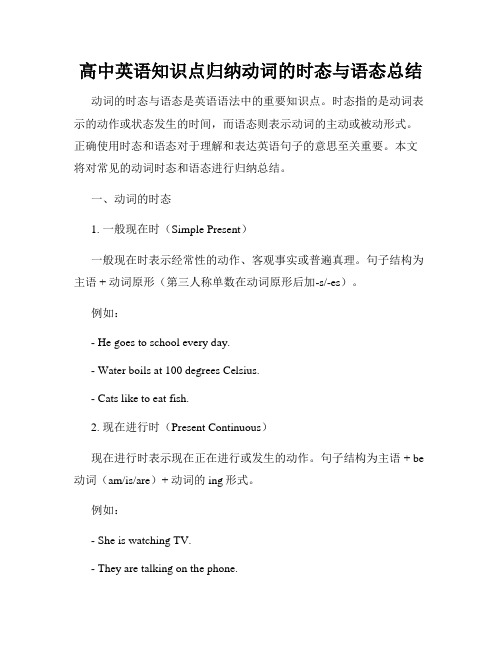
高中英语知识点归纳动词的时态与语态总结动词的时态与语态是英语语法中的重要知识点。
时态指的是动词表示的动作或状态发生的时间,而语态则表示动词的主动或被动形式。
正确使用时态和语态对于理解和表达英语句子的意思至关重要。
本文将对常见的动词时态和语态进行归纳总结。
一、动词的时态1. 一般现在时(Simple Present)一般现在时表示经常性的动作、客观事实或普遍真理。
句子结构为主语 + 动词原形(第三人称单数在动词原形后加-s/-es)。
例如:- He goes to school every day.- Water boils at 100 degrees Celsius.- Cats like to eat fish.2. 现在进行时(Present Continuous)现在进行时表示现在正在进行或发生的动作。
句子结构为主语 + be 动词(am/is/are)+ 动词的ing形式。
例如:- She is watching TV.- They are talking on the phone.- We are studying for the exam.3. 一般过去时(Simple Past)一般过去时表示发生在过去的动作或状态。
句子结构为主语 + 动词过去式。
例如:- I visited my grandparents last weekend.- He studied English in high school.- They went to the concert together.4. 过去进行时(Past Continuous)过去进行时表示过去某个时间点正在进行或发生的动作。
句子结构为主语 + was/were + 动词的ing形式。
例如:- She was cooking dinner when I called her.- They were playing soccer at the park yesterday.- We were watching a movie when the power went out.5. 一般将来时(Simple Future)一般将来时表示将来某个时间要发生的动作。
高中时态语态总结

高中时态语态总结一、时态总结英语中的时态分为简单时态、进行时态、完成时态和完成进行时态四种。
1. 简单时态表示现在、过去或将来的动作或状态,包括一般现在时、一般过去时和一般将来时。
- 一般现在时:主语+动词原形(第三人称单数要加-s或-es)例句:I study English every day.(我每天学习英语。
)- 一般过去时:主语+动词过去式例句:He played basketball yesterday.(他昨天打篮球。
)- 一般将来时:主语+will/shall+动词原形例句:We will go to the park tomorrow.(我们明天去公园。
)2. 进行时态表示正在进行的动作,包括现在进行时和过去进行时。
- 现在进行时:主语+be动词+现在分词例句:She is watching TV now.(她正在看电视。
)- 过去进行时:主语+was/were+现在分词例句:They were playing football at that time.(那个时间他们正在踢足球。
)3. 完成时态表示已经完成的动作,包括现在完成时和过去完成时。
- 现在完成时:主语+have/has+过去分词例句:I have finished my homework.(我已经完成了我的作业。
)- 过去完成时:主语+had+过去分词例句:He had already left when I arrived.(我到达时他已经离开了。
)4. 完成进行时态表示过去一段时间一直在进行的动作,包括现在完成进行时和过去完成进行时。
- 现在完成进行时:主语+have/has been+现在分词例句:She has been studying English for three years.(她已经学习英语三年了。
)- 过去完成进行时:主语+had been+现在分词例句:He had been working for five hours when he stopped.(他停止工作的时候已经工作了五个小时了。
高中英语时态语态总结
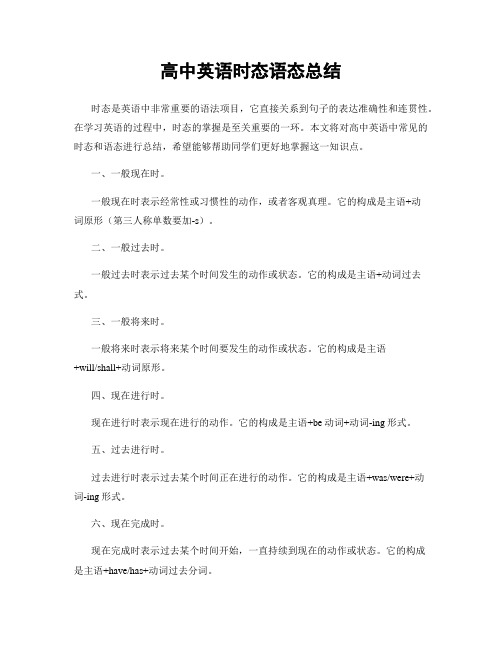
高中英语时态语态总结时态是英语中非常重要的语法项目,它直接关系到句子的表达准确性和连贯性。
在学习英语的过程中,时态的掌握是至关重要的一环。
本文将对高中英语中常见的时态和语态进行总结,希望能够帮助同学们更好地掌握这一知识点。
一、一般现在时。
一般现在时表示经常性或习惯性的动作,或者客观真理。
它的构成是主语+动词原形(第三人称单数要加-s)。
二、一般过去时。
一般过去时表示过去某个时间发生的动作或状态。
它的构成是主语+动词过去式。
三、一般将来时。
一般将来时表示将来某个时间要发生的动作或状态。
它的构成是主语+will/shall+动词原形。
四、现在进行时。
现在进行时表示现在进行的动作。
它的构成是主语+be动词+动词-ing形式。
五、过去进行时。
过去进行时表示过去某个时间正在进行的动作。
它的构成是主语+was/were+动词-ing形式。
六、现在完成时。
现在完成时表示过去某个时间开始,一直持续到现在的动作或状态。
它的构成是主语+have/has+动词过去分词。
七、过去完成时。
过去完成时表示过去某个时间之前已经完成的动作或状态。
它的构成是主语+had+动词过去分词。
八、一般将来完成时。
一般将来完成时表示将来某个时间之前已经完成的动作或状态。
它的构成是主语+will/shall+have+动词过去分词。
九、被动语态。
被动语态表示主语是动作的承受者。
它的构成是be动词+动词过去分词。
十、情态动词。
情态动词包括can, could, may, might, must, shall, should, will, would等。
它们用来表示说话人的态度、情感或推测。
总结,时态和语态是英语语法中的重要内容,它们直接关系到句子的表达准确性。
在学习过程中,我们要多加练习,多加总结,才能够真正掌握好这一知识点。
希望本文的总结能够帮助大家更好地理解和掌握高中英语中的时态和语态。
高中英语 动词的时态、语态和主谓一致精讲

(3)表示人的“观点” “看法” “建议” “态 度” “评价”等词、“活动的目的”以及客观 事实时,常用一般现在时。
A good medicine __t_a_s_te_s__(taste) bitter. Our geography teacher told us that the earth __g_o_es_(go) around the sun.
2
(2)用于状语从句代替一般将来时 在when , as soon as , before , after , until , if 等引 导的时间状语或条件状语从句,谓语动词是将来 时通常用一般现在时代替。 “主将从现”
If he succeeds(succeed), he will be the hero of human beings.
Terry and his wife were tidying up their new home busilyw_h_e_n_ the light suddenly went out.
I was about to go out w__h_e_n the telephone rang.
9
6.现在完成时 构成形式: 助动词have/has + 动词的过去分词
4
2.一般过去时 构成形式 did
表示过去某一时间点发生的动作或所处的状态.
注意:一般过去时往往和明确的过去时间状语连 用.如: yesterday, last night, two days (months, weeks) ago, in 1996, the other day也常和when, if 等 引导的状语从句连用.
10
So far, it has turned (turn) the most influential student activity in the world.
高中英语知识点归纳动词的语态与时态

高中英语知识点归纳动词的语态与时态动词的语态与时态是高中英语学习中的重点难点之一。
正确掌握动词的语态与时态,不仅可以提高英语写作和阅读的能力,还能帮助我们更好地理解英语语法和文化。
本文将系统性地对动词的语态与时态进行归纳总结,旨在帮助高中生更好地掌握这一知识点。
一、动词的语态动词的语态主要分为主动语态和被动语态两种。
1. 主动语态(active voice)在主动语态中,主语是动作的执行者或者发出者。
主动语态通常由主语+及物动词+宾语构成。
例如:- She writes a letter.(她写了一封信。
)- They are building a new house.(他们正在盖一座新房子。
)- We have eaten dinner.(我们已经吃晚饭了。
)2. 被动语态(passive voice)在被动语态中,主语是动作的承受者或者接受者。
被动语态通常由宾语+及物动词+be动词+过去分词构成。
例如:- A letter is written by her.(一封信被她写了。
)- A new house is being built by them.(一座新房子正在被他们建造。
)- Dinner has been eaten by us.(晚饭已经被我们吃了。
)要注意的是,被动语态中的宾语在主动语态中通常是作为及物动词的宾语出现的。
同时,被动语态还可以通过不定式或现在分词的形式进行表达。
例如:- The meeting is to be held tomorrow.(会议将于明天举行。
)- The book left on the desk is mine.(留在桌子上的书是我的。
)二、动词的时态动词的时态主要包括一般现在时、一般过去时、一般将来时、现在进行时、过去进行时、过去将来时、现在完成时、过去完成时等。
1. 一般现在时(simple present tense)一般现在时表示现在经常或习惯性发生的动作或存在的状态。
(完整)高中英语语法(时态和语态)
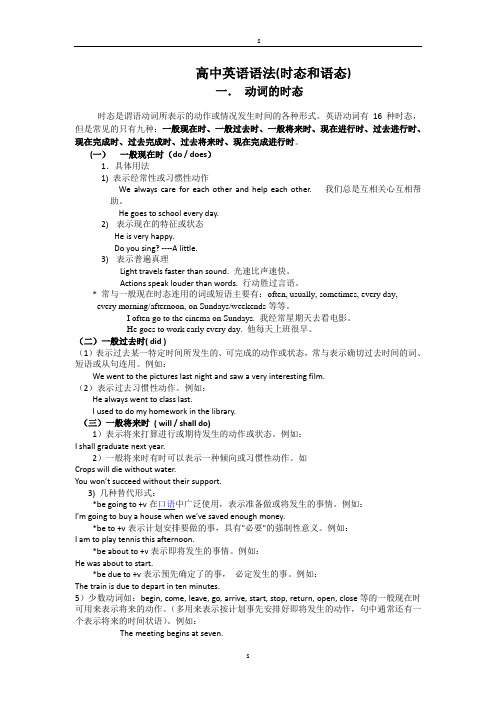
高中英语语法(时态和语态)一.动词的时态时态是谓语动词所表示的动作或情况发生时间的各种形式。
英语动词有16种时态,但是常见的只有九种:一般现在时、一般过去时、一般将来时、现在进行时、过去进行时、现在完成时、过去完成时、过去将来时、现在完成进行时。
(一)一般现在时(do / does)1.具体用法1) 表示经常性或习惯性动作We always care for each other and help each other. 我们总是互相关心互相帮助。
He goes to school every day.2)表示现在的特征或状态He is very happy.Do you sing? ----A little.3)表示普遍真理Light travels faster than sound. 光速比声速快。
Actions speak louder than words. 行动胜过言语。
* 常与一般现在时态连用的词或短语主要有:often, usually, sometimes, every day,every morning/afternoon, on Sundays/weekends等等。
I often go to the cinema on Sundays. 我经常星期天去看电影。
He goes to work early every day. 他每天上班很早。
(二)一般过去时( did )(1)表示过去某一特定时间所发生的、可完成的动作或状态,常与表示确切过去时间的词、短语或从句连用。
例如:We went to the pictures last night and saw a very interesting film.(2)表示过去习惯性动作。
例如:He always went to class last.I used to do my homework in the library.(三)一般将来时( will / shall do)1)表示将来打算进行或期待发生的动作或状态。
高中英语时态语态讲解 PPT

3、 ---Nancy is not ing tonight、
进行体: 它具有暂时性、持续性、未完成性得特点。 现在进行时: 表示此刻或现阶段进行得动作。 过去进行时: 用来表示过去特定得某一时刻正在发生或过 去某一段时间内持续发生得事情。
closes、
3、 进行时将来:表示计划、安排要做得事。如: •I’ve won a holiday for two days to Florida、 I am taking my mum、 •— What were you doing when Tony phoned
you ?
— I had just finished my work and was starting to take a shower、
得不定式被动式有特殊得用法。
• The news is to be found in the evening paper 、
• He is nowhere to be seen、 • You are to be congratulated、 应当向您表示祝
贺。
5、 will/shall will得特殊用法:可以用于表示事先未考虑过, 即说话时临时想到得。 Eg、 ---you’ve left the light on、
1、 All morning as she waited for the
medical report from the doctor, her
nervousness 、
A、has grown
B、is growingC、grwD、had grown
2、 My mind wasn’t on what he was
高中英语时态语态讲解及习题
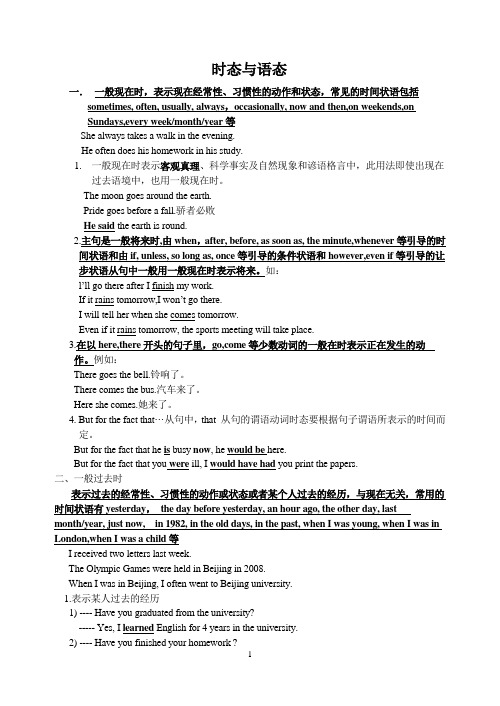
时态与语态一.一般现在时,表示现在经常性、习惯性的动作和状态,常见的时间状语包括sometimes, often, usually, always,occasionally, now and then,on weekends,onSundays,every week/month/year等She always takes a walk in the evening.He often does his homework in his study.1.一般现在时表示客观真理、科学事实及自然现象和谚语格言中,此用法即使出现在过去语境中,也用一般现在时。
The moon goes around the earth.Pride goes before a fall.骄者必败He said the earth is round.2.主句是一般将来时,由when,after, before, as soon as, the minute,whenever等引导的时间状语和由if, unless, so long as, once等引导的条件状语和however,even if等引导的让步状语从句中一般用一般现在时表示将来。
如:l’ll go there after I finish my work.If it rains tomorrow,I won’t go there.I will tell her when she comes tomorrow.Even if it rains tomorrow, the sports meeting will take place.3.在以here,there开头的句子里,go,come等少数动词的一般在时表示正在发生的动作。
例如:There goes the bell.铃响了。
There comes the bus.汽车来了。
Here she comes.她来了。
4. But for the fact that…从句中,that 从句的谓语动词时态要根据句子谓语所表示的时间而定。
高中英语语法:动词的时态与语态知识点
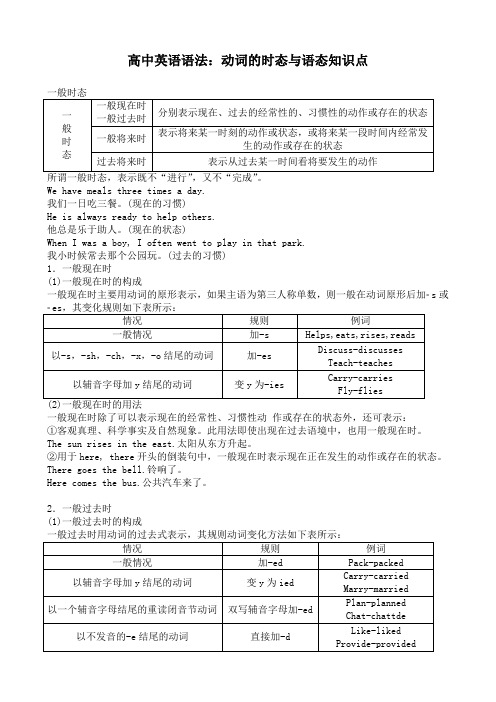
高中英语语法:动词的时态与语态知识点We have meals three times a day.我们一日吃三餐。
(现在的习惯)He is always ready to help others.他总是乐于助人。
(现在的状态)When I was a boy, I often went to play in that park.我小时候常去那个公园玩。
(过去的习惯)1.一般现在时(1)一般现在时的构成一般现在时主要用动词的原形表示,如果主语为第三人称单数,则一般在动词原形后加s或一般现在时除了可以表示现在的经常性、习惯性动作或存在的状态外,还可表示:①客观真理、科学事实及自然现象。
此用法即使出现在过去语境中,也用一般现在时。
The sun rises in the east.太阳从东方升起。
②用于here, there开头的倒装句中,一般现在时表示现在正在发生的动作或存在的状态。
There goes the bell.铃响了。
Here comes the bus.公共汽车来了。
2.一般过去时(1)一般过去时的构成(2)一般过去时的用法一般过去时除了可以表示过去经常性、习惯性的动作或存在的状态外,还有以下用法:①want, hope, think, intend等动词的一般过去时往往表示“过去原……”之意。
I thought he was an honest man.我原以为他是个老实人。
He didn't intend to hurt you.他本来没打算伤害你。
②wonder的一般过去时有时也可表示现在的行为,但口气要比用一般现在时更加委婉、客气。
I wondered if you could do me a favour.我不知道你能否帮我一个忙。
③used to+动词原形,表示过去的习惯性动作而现在已经不再发生了。
We used to spend our vacation in the mountains.我们以前常常在山里度假。
高中英语语法动词的时态和语态详解及练习附答案

动词的时态和语态一、知识框架二、知识梳理动词不定式的基本形式是“to+动词原形”有时可以不带to,否定式:not + (to) do。
动词不定式没有人称和数的变化,在句子中不能作谓语,但具有名词、形容词、副词的特征,可以担任主语、表语、宾语、定语、状语和宾语补足语。
动词不定式仍保留动词的一些特点。
一)不定式的句法功能(1)作主语:不定式作主语时,一般表具体的、个别的、一次性的或具有将来意义的动作。
To forgive is the best virtue of life.人生最好的美德是宽恕。
To finish the work in ten minutes is very hard. 十分钟之内完成这项工作是很难的。
To lose your heart means failure. 灰心意味着失败。
若主语较长,常用it作形式主语,真正的主语不定式置于句后,上面两句可用如下形式:It is very hard to finish the work in ten minutes.It means failure to lose your heart.常用句式有:It+be+名词+to doIt takes sb+some time+to doIt+be+形容词+of/for sb +to doHow + adj. + it is + to do sth.!①如果句中的形容词表示人物特征或品质,常同of搭配构成“It is + 形容词+of+代词(名词)+不定式”句型。
如:bold, brave, careful, careless, considerate, cruel, rude, generous, right, wrong, kind, nice, good, polite, clever, wise, foolish, silly等。
②表示事物性质的形容词如easy, difficult, hard, important, impossible, possible, safe, dangerous, necessary常同for 搭配。
高中英语时态和语态用法详解

动词的时态和语态用法1. 时态的定义:动词在不同的时间环境下表示发生的动作或存在形式。
按动作发生时间分为现在时态、过去时态、将来时态及过去将来时态, 按模式可以分为一般时态, 进行时态, 完成时态及完成进行时态。
2. 不同时态的基本构成形式:3. 常见具体时态的基本用法:Ⅰ. 一般现在时态基本:一般现在时是描述目前可以经常反复性出现的动作或状态。
常和表示频率、时间的副词(短语)always, every time, now and then, occasionally, often, seldom, sometimes, usually等连用。
1)表示经常性或习惯性的动作。
We have three meals a day.2)表示客观事实、真理和自然现象。
Knowledge is power.3)表示现在的情况或状态。
I live in Beijing.4)表示已经“列入日程”的将来的事件,尤其指计划中的和安排好的将来的动作,这些动词往往表示“出发,到达”等含义的词,如,arrive, begin, go, leave, start, stay等。
The train arrives at 10:30. There's plenty of time.※:表示永恒的真理,即使出现在过去的语境中,仍用一般现在时。
如:I learned that the earth goes around the sun when I was in primary school.※:在时间和条件状语从句中,代替一般将来时;常用的引导词有:时间:when, until, after, before, as soon as, once, the moment/the minute, the day; 条件:if, unless, provided.If he accepts the job, he will get more money soon.※:在make sure (certain), see to it, mind, care, matter +宾语从句,从句用一般现在时代替一般将来时。
高中英语中的16种时态详细讲解
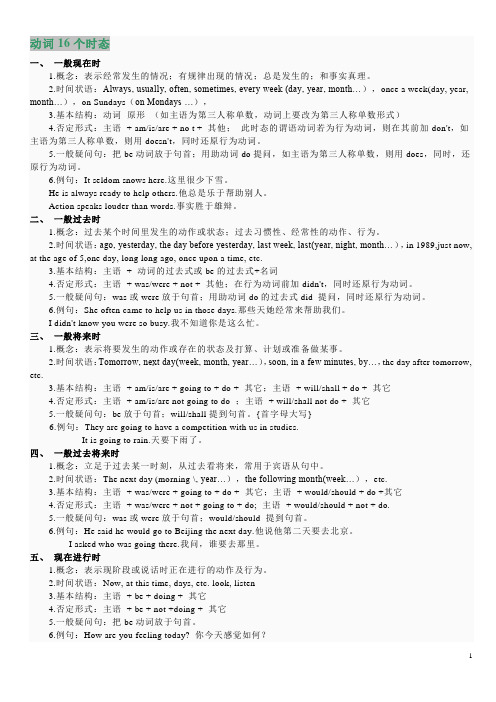
动词16个时态一、一般现在时1.概念:表示经常发生的情况;有规律出现的情况;总是发生的;和事实真理。
2.时间状语:Always, usually, often, sometimes, every week (day, year, month…),once a week(day, year, month…),on Sundays(on Mondays …),3.基本结构:动词原形(如主语为第三人称单数,动词上要改为第三人称单数形式)4.否定形式:主语+ am/is/are + no t + 其他;此时态的谓语动词若为行为动词,则在其前加don't,如主语为第三人称单数,则用doesn't,同时还原行为动词。
5.一般疑问句:把be动词放于句首;用助动词do提问,如主语为第三人称单数,则用does,同时,还原行为动词。
6.例句:It seldom snows here.这里很少下雪。
He is always ready to help others.他总是乐于帮助别人。
Action speaks louder than words.事实胜于雄辩。
二、一般过去时1.概念:过去某个时间里发生的动作或状态;过去习惯性、经常性的动作、行为。
2.时间状语:ago, yesterday, the day before yesterday, last week, last(year, night, month…),in 1989,just now, at the age of 5,one day, long long ago, once upon a time, etc.3.基本结构:主语+ 动词的过去式或be的过去式+名词4.否定形式:主语+ was/were + not + 其他;在行为动词前加didn't,同时还原行为动词。
5.一般疑问句:was或were放于句首;用助动词do的过去式did 提问,同时还原行为动词。
高中英语动词时态语态讲解

1、一般现在时主要用来表示人、事物的现在状况和特点;表示经常或习惯性的动作,句子中常有often, always, from time to time 等时间状语;表示客观规律和永恒真理等。
He usually goes to work at 7 o’clock every morning.The earth goes around the sun.Guangzhou is situated in the south of China.考点一:表示永恒的真理,即使出现在过去的语境中,仍用一般现在时。
如:I learned that the earth goes around the sun when I was in primary school.考点二:在时间和条件状语从句中,代替一般将来时;常用的引导词有:时间:when, until, after, before, as soon as, once, the moment/the minute, the day; 条件:if, unless, provided.If he accepts the job, he will get more money soon.考点三:在make sure (certain), see to it, mind, care, matter +宾语从句,从句用一般现在时代替一般将来时。
So long as he works hard, I don’t mind when he finishes the experiment.只要他努力工作,我不介意他什么时候做完试验。
考点四:在the more… the more … (越…越…) 句型中, 若主句是一般将来时, 从句通常用一般现在时。
The harder you study, the better results you will get.2、现在进行时表说话时或目前一段时间内正在进行的活动:或表感情色彩,加强语气。
- 1、下载文档前请自行甄别文档内容的完整性,平台不提供额外的编辑、内容补充、找答案等附加服务。
- 2、"仅部分预览"的文档,不可在线预览部分如存在完整性等问题,可反馈申请退款(可完整预览的文档不适用该条件!)。
- 3、如文档侵犯您的权益,请联系客服反馈,我们会尽快为您处理(人工客服工作时间:9:00-18:30)。
进行体: ① 一个长动作作为背景,被一个短动作打断,长 动作往往用进行体,短动作用一般体。如: •My brother fell while he was riding his bicycle and hurt himself. •The reporter said that the UFO was traveling from east to west when he saw it. ② 表示动作的未完性、暂时性。如: •I don’t really work here; I am just helping out until the new secretary arrives. •Selecting a mobile phone for a personal use is not easy task because technology is changing so rapidly.
He served in the army from 1952 to 1954. •现在完成时常用的状语有already, yet, never, before lately, recently, in the last / past few days / years (在过去的这几天/年里),since then, up to now, so far, upon to now等
A. was playing
B. played
C. has played
D. had played
过去完成时:
表示过去的过去,应有一个过去的时间做参 点。
Eg. She had been ill for a week before she came back.
She has been ill for a week. (现在仍在生病) 注:在before或after引导的时间状语从句中可以 用一般过去时代替过去完成时。 •After he left the room, a thief came in. •We arrived home before it rained.
一般现在时:
表示经常性、习惯性的动作,也可 用于陈述真理、客观事实。
1.When I was young, our teachers often told
us that knowledge is power.
2. He often comes late. 3. The sun rises in the east and sets down in
④ 表示现在或当时发展中的或正在进行的情况。 • I first met Lisa 3 years ago. She was working at a radio shop at the time. • — Hey, look where you are going!
— Oh, I’m terribly sorry, I wasn’t noticing.
⑤ 进行时态与constantly, always, forever连 用,带有感情色彩(如感叹、惊讶、厌烦 等)。 •I’m always hearing strange things about him. •He is always leaving things about.
下列几类动词不用进行时时态
was at college.
3. ---Nancy is not coming tonight.
---But she promised.
进行体: 它具有暂时性、持续性、未完成性的特点。 现在进行时: 表示此刻或现阶段进行的动作。 过去进行时: 用来表示过去特定的某一时刻正在发生或过 去某一段时间内持续发生的事情。
• 表示思考、理解等心理活动的动词:believe, doubt, forget, know, remember, understand等。
现在完成时:
表示过去的动作或状态对现在的影响或对 现在造成的结果。以现在时间为参照点。
Eg. He has served in the army for 5 years.
the west. 4. Practice makes perfect.
一般过去时:
是与“现在没有联系的时态”,只强调过去 的事实,不强调与现在的关系;语境中的过 去式常表示“刚才,曾经”之意,暗示现在已 “不再这样”。表示对过去某时或某时期的 动作或状态,或过去习惯的动作。
1.Your phone number again? I didn’t quite catch it.
never regretted my final decision to move
back to China.
A. lived
B. was living
C. have lived D. had lived
3. He _____ football regularly for many years
when he was young.
1. Although he has lived with us for years, he
____ us much impression.
A. hadn't left
B. didn't leave
C. doesn't leave D. hasn't left
2. I in London for many years,but I’ve
③ 表示计划、安排要做的事。如: • I’ve won a holiday for two days to Florida. I am taking my mum. • — What were you doing when Tony phoned you ?
— I had just finished my work and was starting to take a shower.
• 感知或感觉的动词:hear, see, seem, smell, sound, look, feel等。
• 表示心理或情感的动词:like, love, hate, prefer, wish等。
• 表示状态存在的动词:be, exist, remain, stay, 等。
• 表示占有或存属关系动词:have, own, belong, contain等。
